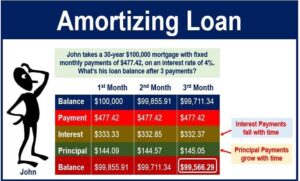
In 2024, effective management of debt is more crucial than ever for maintaining strong financial health. Loan amortization, a term often encountered in the realm of borrowing, plays a significant role in how loans are repaid over time. Understanding loan amortization can empower you to manage your debt better and improve your financial situation. This article delves into how loan amortization impacts your financial health and offers practical tips for managing your debt effectively.
What is Loan Amortization?
Loan amortization refers to the process of paying off a loan through regular payments over a specified period. These payments consist of both principal and interest. Initially, a larger portion of the payment goes toward interest, but over time, more of the payment is applied to the principal. This structure helps borrowers systematically reduce their debt and eventually pay off the loan.
The Impact of Loan Amortization on Financial Health
- Predictable Payments: Amortized loans come with fixed payments, which can simplify budgeting and financial planning. Knowing exactly how much you need to pay each month helps in managing your cash flow and ensures that you’re not caught off guard by fluctuating payment amounts.
- Interest vs. Principal Payments: In the early stages of the loan, the majority of your payment is applied toward interest rather than principal. This means that your balance decreases more slowly initially. Understanding this can help you anticipate the impact of your payments on your overall debt and plan accordingly.
- Building Equity: As you continue to make payments, you gradually build equity in the asset financed by the loan. For mortgages, this means owning more of your home over time. Building equity is a positive aspect of amortization, as it contributes to long-term financial stability and wealth accumulation.
- Debt Reduction Strategy: Amortized loans help in creating a structured debt reduction plan. By adhering to your payment schedule, you ensure consistent progress in reducing your debt. This structured approach can be particularly beneficial for long-term financial health.
Tips for Managing Debt in 2024
- Understand Your Loan Terms: Before committing to a loan, thoroughly review the terms and amortization schedule. Knowing the breakdown of your payments helps you understand how much is going toward interest versus principal and plan your budget accordingly.
- Prioritize High-Interest Debt: If you have multiple loans, focus on paying off those with higher interest rates first. This strategy can save you money on interest in the long run and accelerate your overall debt reduction.
- Consider Extra Payments: Making extra payments toward your loan principal can shorten the loan term and reduce the total interest paid. Even small additional payments can have a significant impact over time.
- Refinance When Beneficial: Refinancing can be a useful tool for managing debt, especially if interest rates have decreased since you took out the loan. Lowering your interest rate can reduce your monthly payments and the total cost of the loan.
- Utilize Budgeting Tools: Leverage budgeting tools and apps to keep track of your loan payments and financial goals. These tools can help you stay organized and ensure that you’re making progress toward reducing your debt.
- Maintain an Emergency Fund: Having an emergency fund is crucial for managing unexpected expenses without derailing your debt repayment plan. Aim to save three to six months’ worth of living expenses to provide a financial cushion.
- Seek Professional Advice: If you’re struggling with debt management or finding it challenging to stay on track, consider consulting a financial advisor. They can provide personalized advice and strategies tailored to your financial situation.
Conclusion
Loan amortization plays a pivotal role in shaping your financial health by determining how your loan payments are structured and how quickly you can reduce your debt. By understanding the intricacies of loan amortization and implementing effective debt management strategies, you can improve your financial well-being in 2024. From prioritizing high-interest debt to making extra payments and seeking professional advice, taking proactive steps can lead to better financial stability and long-term success.



